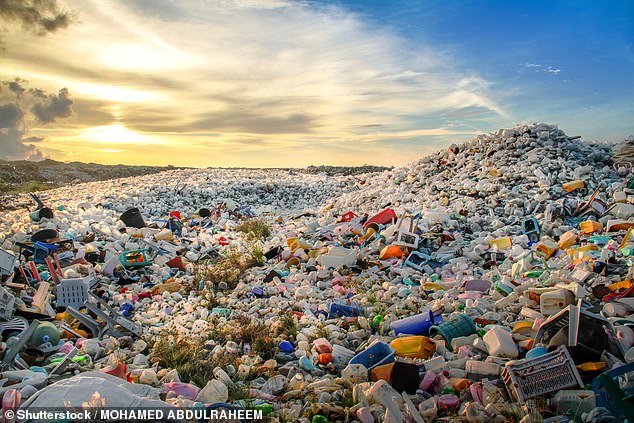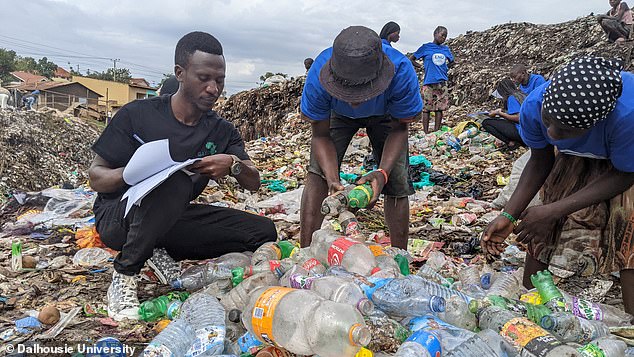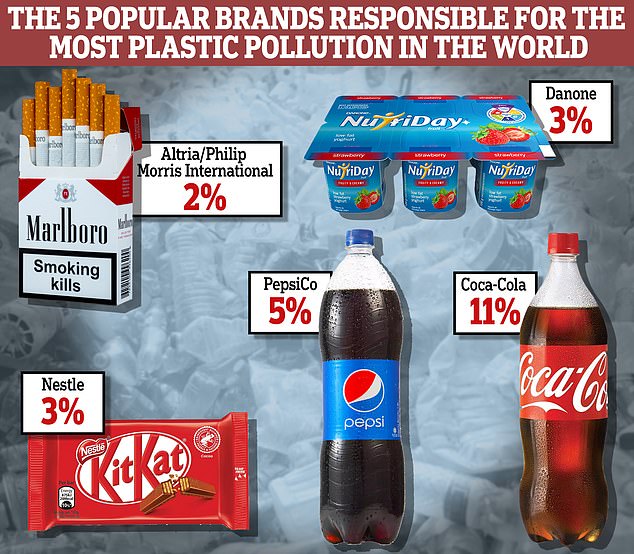Many of us are doing everything we can to reduce our plastic consumption.
But despite our best efforts, figures suggest a whopping 220 million tonnes of plastic waste will be generated this year.
Now, a study has revealed the popular brands responsible for the vast majority of branded plastic pollution in the world.
The Coca-Cola Company tops the list as the number one polluter and is responsible for 11 percent of all brand waste, according to researchers at Dalhousie University.
“This global data on plastic pollution speaks for itself and unequivocally demonstrates that the world’s leading producers are the biggest plastic polluters,” said study co-author Dr. Tony Walker.
A study has revealed the popular brands responsible for the vast majority of branded plastic pollution in the world.

Many of us are doing everything we can to reduce our plastic consumption. But despite our best efforts, figures suggest that a whopping 220 million tonnes of plastic waste will be generated this year.
In their study, the researchers set out to understand whether or not there is a link between plastic production and plastic pollution.
The team analyzed five years of data from 1,576 audit events in 84 countries.
These brand audits are citizen science initiatives, in which volunteers conduct waste cleanups and document the brands collected.
Their analysis revealed a “clear link” between plastic production and pollution.
In fact, they found that a one percent increase in plastic production resulted in a one percent increase in pollution.
In terms of specific brands, researchers found that 56 global companies are responsible for more than 50 percent of all branded plastic pollution.
The top five producers were The Coca-Cola Company (11 percent), PepsiCo (five percent), Nestlé (three percent), Danone (three percent) and Altria/Philip Morris International (two percent).
However, more than half of the plastic items recovered were unbranded, making it difficult to locate the companies responsible.

The team analyzed five years of data from 1,576 audit events in 84 countries. These brand audits are citizen science initiatives, in which volunteers conduct waste cleanups and document the brands collected.
To avoid this problem in the future, the researchers suggest creating an open-access international database in which companies are required to track and report their products, packaging and brands to the environment.
Overall, researchers say the key to curbing plastic pollution is to reduce the production of single-use plastic items.
“When I first saw the relationship between production and pollution, I was shocked,” said Win Cowger of the Moore Institute for Plastic Pollution Research.
‘Despite everything the big brands say they are doing, we see no positive impact on their efforts.
“But on the other hand, it gives me hope that reducing plastic production by fast-moving consumer goods companies will have a strong positive impact on the environment.”
MailOnline has contacted PepsiCo, Danone and Altria/Philip Morris International for comment.
A Coca-Cola Great Britain spokesperson said: “We care about the impact of every drink we sell and are working to reduce the amount of plastic packaging we use.”
“We have the ambitious goal of collecting and recycling one bottle or can for every one we sell by 2030.
“In addition, we support well-designed deposit return systems across Europe that we know can help us get our packaging back.”
A Nestlé spokesperson added: “Plastic pollution is a serious problem and we are working hard to help tackle it.
‘We have reduced our use of new (virgin) plastic by 14.9% in the last five years.
‘At Nestlé, we have more than 220 initiatives to develop waste collection, sorting and recycling schemes that work well in Europe, Africa, Asia, North America and Latin America.
“We will continue this work to keep packaging materials in the circular economy and out of the environment.”

